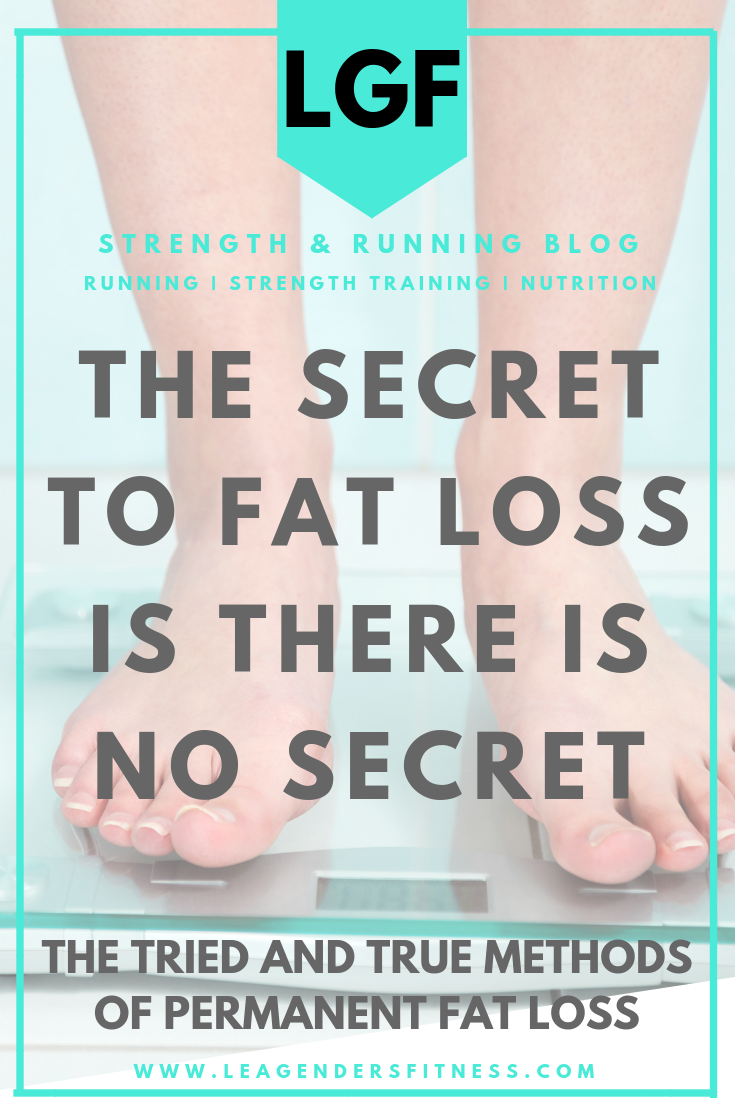If you’ve been following health and fitness accounts on the internet for any amount of time, you’ve likely come across quite a few articles promising the secret to fat loss.
If you’re looking for the secret to fat loss, it’s no secret.
The secret to fat loss is there is no secret. Save to your favorite Pinterest board for later.
EAT IN A CALORIE DEFICIT TO LOSE FAT
To lose fat you need to eat in a calorie deficit. That means you need to consume fewer calories in a day that you use. You can achieve a deficit with a combination of eating fewer calories and exercising. A moderate calorie deficit of 300-500 calories a day should get the ball rolling for fat loss for most people. But don’t go crazy, if you reduce your calories too drastically it could backfire.
A mistake a lot of people make is they go from their regular unhealthy diet to a “perfect” diet, and the calorie drop is way too much. You don’t need an overhaul. Just look for ways to cut 300-500 calories per day. You can continue to evolve and improve your diet over time, don’t feel like you need to do it all at once to get results. You don’t.
How many calories does that mean you should eat? Every person is different. Even two people the same age, body type, and weight may have different calorie needs. There are calorie calculators that can help you estimate, but they are just that…estimates. It’s your job to do the work to figure it out for yourself.
It takes some experimenting. Try lowering your calories and see if you lose weight. It can get complicated when we start to factor in lifestyle and hormones, but as a starting point, cut 300-500 calories from what you usually eat and see what happens. Pay attention to the results and adjust as is necessary week after week until you get it right.
If you start to lose weight too fast (more than 3 pounds per week), add back additional healthy calories or reduce cardio exercise. Losing the weight slowly over time is the best method for permanent fat loss. When you lose weight too fast, it’s a likely indicator that you are losing both fat and muscle. We want to preserve muscle tissue as much as possible when losing weight by dropping weight slowly, eating adequate protein, and doing resistance training.
EAT WHOLE FOODS FROM NATURE PREPARED AT HOME MOST OF THE TIME
While there is nothing wrong with an occasional treat, aim to eat whole foods from nature prepared at home 80-90% of the time. Processed foods can cause inflammation and digestive issues which can mask or stall progress. Eating restaurant meals on a regular basis makes it more challenging to stay in a calorie deficit. (It’s possible, just more difficult than eating at home.)
Be mindful of eating the foods that make your body look, feel and perform its best. Everyone is different. Some people have allergies and intolerances, while others don’t. Some people respond well to whole-food carbohydrates, some people prefer heart-healthy fats. Eat mostly unprocessed foods that make you feel good inside and out. Pay attention to how the foods you eat make you feel and adjust accordingly.
BUILD MUSCLE
You can’t spot reduce fat, but you are able to build muscle specifically where you want. If you want a flatter stomach, you can take the steps above to help reduce overall body fat and then do abdominal exercises to build those muscles. However, the best way to improve your body composition and lose fat is to build muscle all over.
I’m not suggesting you become a bodybuilder or grow forearms like Popeye. Losing fat and gaining muscle helps you appear leaner, even if you stay the same weight because pound for pound muscle takes up less space in the body than fat. That means you may weigh the same, but wear a pant size a few sizes smaller.
Muscle doesn’t make women look bulky unless they take steroids or if they are specifically training for that look, large muscles don’t happen by mistake. Women who weight train are typically leaner and fitter than women that don’t.
Muscle burns more calories than fat at rest, so the more muscle you have, the higher your metabolism. That means once you build muscle you’ll likely need to eat more to maintain your weight (wahoo).
THE ONE THING YOU MAY HAVE OVERLOOKED
I mentioned above that hormones can play a role in fat loss. If you seem to be doing everything right but not seeing the results you desire over a considerable period of time (give it time), you may want to work with your doctor to get your hormones checked. If you need help, see a registered dietitian or nutritionist.
While some of this is definitely out of our control (hello menopause) sleep and stress play a large role in hormone regulation and fat loss, so make sure you are getting 7-9 hours of quality sleep each night, and working to keep stress at bay through meditation, exercise, prayer, quiet time, rest, or other relaxing activities. Although it is often overlooked, stress and lifestyle play a significant role in fat loss.
There’s no magic to fat loss. There’s no secret. Work on improving your lifestyle, your eating habits, and move your body consistently over time for the results you desire. If you’re consistent and patient, you’ll get there.
Did you like this post? Do you know someone who might benefit? It helps me when you share with your friends and followers.













If you've ever wondered whether you're addicted to sugar, this blog post is for you. The good news? You have more control than you might think. With a few mindset shifts and intentional habits, you can train your brain to enjoy sugar without feeling controlled by it—finding balance without deprivation for a healthier, more sustainable approach.